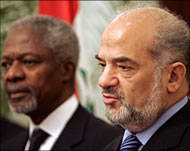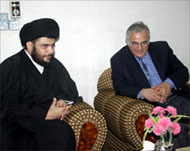Jaafari backtracks over Iraq PM post
Ibrahim al-Jaafari has told Iraq’s Shia alliance he was no longer insisting on being the country’s prime minister, saying his fate now rests in the hands of the alliance members.

The announcement on Thursday morning came just hours before the Iraqi parliament was to meet for only the second time since a landmark election in December, with political leaders still squabbling over top government posts.
Jawad al-Maliki, a key leader in the conservative Shia bloc, the United Iraq Alliance, said: “Jaafari has left the decision about his candidacy with the alliance.”
“Mr Jaafari told the alliance today that it was up to it to decide whether it feels it is necessary” to have him as the next prime minister, “which means he is no longer insisting on the post,” al-Maliki said.
“Now it will be the alliance which will decide.”
On Wednesday, al-Jaafari had remained defiant, despite opposition to his candidacy from Sunni Arab and Kurdish politicians, saying: “I am the candidate and the alliance chose me.”
Pressure
 |
|
Al-Jaafari is no longer insisting |
The plan to convene the Iraqi assembly was announced as the United States and United Nations redoubled efforts to urge rival political leaders to agree on a government to help quell raging violence.
Iraq‘s Kurdish and Sunni leaders have opposed al-Jaafari’s candidacy, saying he has been unable to curb the sectarian violence that has ravaged the country since the bombing of a major Shia shrine in Samarra in February.
The first permanent post-Saddam Hussein parliament was inaugurated on March 16, but swiftly adjourned amid little sign of a deal on a government of national unity.
An earlier parliament session, scheduled for April 17, was cancelled.
Bassem Sharif, an UIA MP, said on Sunday that the postponement aimed “to give time to all the parliamentary blocs to finalise their candidates and reach an agreement on all the parliamentary posts.”
Bush appeals
Underscoring international calls for progress, on Wednesday George Bush, the US president, stepped up pressure for the formation of a national unity government.
 |
|
Qazi (R) met a number of Shia |
“We fully recognise that the Iraqis must step up and form a unity government,” Bush said. “Vacuums in the political process create opportunity for malfeasance and harm.”
His call came as the UN special envoy to Iraq, Ashraf Qazi, held talks with Shia clerics in an attempt to break the impasse.
Qazi, who has until now kept a low profile in Iraqi politics, met a number of top Shia figures in the southern city of Najaf, including Ayatollah Ali al-Sistani and Shia cleric Muqtada al-Sadr.
Speaking to al-Sistani he said the United Nations was “seriously worried about the surge in violence” that followed the February Samarra shrine bombing.
He said fierce fighting between insurgents and US and Iraqi troops in the capital on Monday and Tuesday underscored the urgent need to form a government.